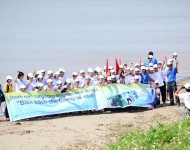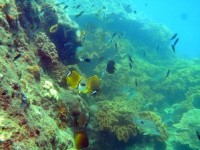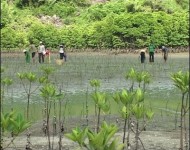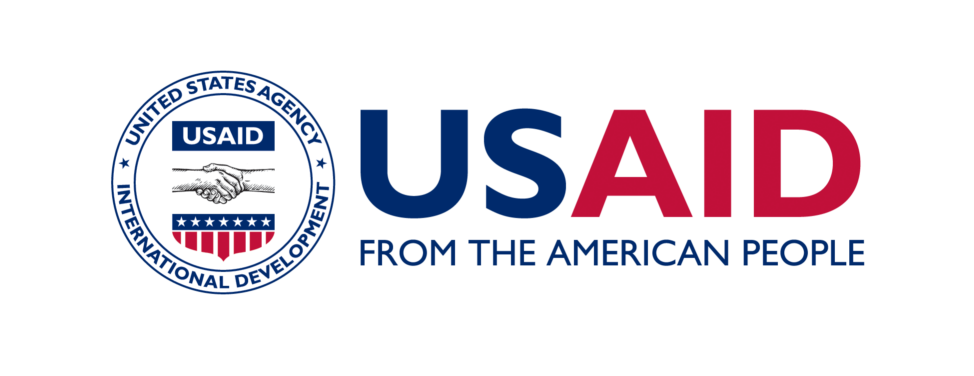Media
Building resilience and enhancing partnership in coastal areas of Vietnam Piloting ERA and Biosphere Reserve approach
Hanoi – On 1st and 2nd of October, the conference named Building resilience and enhancing partnership in coastal area of Vietnam – Piloting Ecological Risk Assessment (ERA) and Biosphere Reserve (BR) approach is held by the Centre for Marinelife Conservation and Community Development (MCD) and the Vietnam MAB (the Man and the Biosphere program) National Committee with the support from the Swedish International Development Agency (Sida) and Embassy of Sweden.
The conference is an open forum for discussing opportunities and challenges of natural resources management and community based adaptive livelihoods in the context of climate change. It also is an occasion to share best practices and lessons learnt from piloting Ecological Risk Assessment (ERA) and biosphere reserve as approach to cope with climate change impact in the Red River Delta. Finally, the conference will enhance the partnerships for building resilience in the coastal areas.

The conference participants are 150 authorities and representatives from participating provinces: Nam Dinh, Thai Binh, Hai Phong, Ninh Binh, representatives from coastal Biosphere Reserves and Heritage sites of Vietnam, donors and International institutions, nongovernmental organizations and research Institutions. Moreover, representatives from UNESCO, SIDA and Stockholm University will attend this conference.
In the two days of the conference, many valuable reports and presentations are provided by professors of Stockholm University (Sweden), representatives of Red River Delta and Cat Ba islands Biosphere Reserves, authorities and experts from nongovernmental organizations inside the country and oversea.
The results and themes discussed at the workshop come from a project named Enhancing resilience of coastal and marine biosphere reserves in Vietnam through strengthening natural resources management and sustaining community livelihoods by Centre for Marinelife Conservation and Community Development (MCD) and the Department of Ecology, Environment and Plant Sciences of the Stockholm University for the period 2011-2013. The project was to improve resistance and resilience of Cat Ba biosphere reserve in the context of climate change and to preserve the harmonious relationship between reserve and community development by improving sea resources management and sustainable livelihoods.

About the contributions of workshop and project in climate change adaption, Professor Hoang Tri, General Secretary of the Vietnam MAB National Committee, said : “ERA, a modern and intellectual methodology, which is highly recommended by the global scientists community, is being applied successfully in the world, especially in developing countries. This methodology brings a great chance for Vietnam to assert our roles and images about intellectual and culture aspects in global community; in which the ways of using the biosphere as tool of climate change adaption are necessary. Specifically, they meet criteria of UNESCO, MAB and the Party’s guidelines; and implement the national priorities in the sustainable strategy of country”.

Until 2013, Vietnam has a total of 8 Biosphere Reserves set up throughout the country, relating to an area of more than 4 million ha with high biodiversity of natural resources and important ecosystems where more than 1.4 million habitants are dependent. Among those the two coastal ones, Red river delta provincial trans-boundary coastal Biosphere reserve and Cat Ba Biosphere Reserve were recognized by UNESCO since 2004. Biosphere reserves worldwide represented different practices; policies and management that coastal communities in Vietnam can learn to increase their resilience to climate change impact while meeting the requirements of natural resources conservation and social economic development. Inspired with support from Sida, in the two mentioned biosphere reserves, innovative approaches have been piloted to help the selected coastal communities in enhancing their natural resources and livelihoods. Among various tools, the Ecological Risk Assessment (ERA) and Biosphere Reserve as an approach in coping with climate change have been introduced and implemented at different levels including the vulnerable communities at risk, the staff at local level (district and communal) and also the authorities at more policy oriented at provincial and interprovincial level.





























